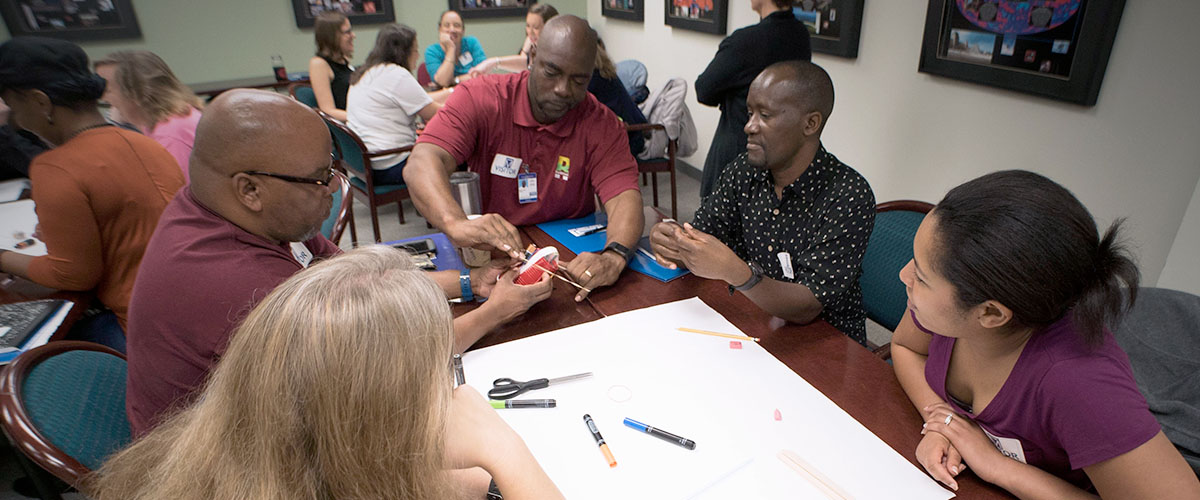Our educator workshops are designed to address national teachers' needs to provide quality science instruction and correlate to state and national standards. Designed for K-12 classroom teachers and informal STEM educators, these hands-on workshops provide strategies for engaging students in inquiry-based, hands-on science. Workshops can be designed to fit in an after-school faculty meeting or for in service on teacher planning days.
Led by the Center's staff, workshops are developed to be hands-on so teachers can try out the activities themselves, giving them the confidence to bring the activities into their classrooms. Content in natural science and the process of scientific inquiry accompanies practice with equipment and materials. Subjects offered for teacher workshops include:
- Teaching Magnetism to Elementary Students – This workshop is aimed at helping teachers work with students to uncover the principles behind magnetism, how they work, and the differences between different types of magnets. Next Generation Science Standards covered include:
- K-PS2-1 Plan and conduct an investigation to compare the effects of different strengths or different directions of pushes and pulls on the motion of an object.
- 3-PS2-3 Ask questions to determine cause and effect relationships of electric or magnetic interactions between two objects not in contact with each other.
- 3-PS2-4 Define a simple design problem that can be solved by applying scientific ideas about magnets.
- 5-PS1-3 Make observations and measurements to identify materials based on their properties.
- Teaching Electricity & Building Circuits – The electricity workshop covers both static and current electricity, how they are created and how to get this phenomenon into the hands of your students. Next Generation Science Standards covered include:
- MS-PS2-3 Ask questions about data to determine the factors that affect the strength of electric and magnetic forces.
- MS-PS2-5 Conduct an investigation and evaluate the experimental design to provide evidence that fields exist between objects exerting forces on each other even though the objects are not in contact.
- HS-PS2-5 Plan and conduct an investigation to provide evidence that an electric current can produce a magnetic field and that a changing magnetic field can produce an electric current.
- HS-PS3-5. Develop and use a model of two objects interacting through electric or magnetic fields to illustrate the forces between objects and the changes in energy of the objects due to the interaction.
- Teaching Electromagnetism – The connection between electricity and magnetism is explored in this workshop with hands-on exploration activities designed to allow students the chance to explore and experiment. Next Generation Science Standards covered include:
- MS-PS2-3 Ask questions about data to determine the factors that affect the strength of electric and magnetic forces.
- MS-PS2-5 Conduct an investigation and evaluate the experimental design to provide evidence that fields exist between objects exerting forces on each other even though the objects are not in contact.
- HS-PS2-5 Plan and conduct an investigation to provide evidence that an electric current can produce a magnetic field and that a changing magnetic field can produce an electric current.
Keep an eye out on the MagLab website for special offerings such as Encouraging a Sense of Wonder: Science for Young Learners and Including all Students in STEM After-School programs. To be updated on these and other future workshops, sign up for the MagLab Educator's Club.
For more information on these or any of the MagLab's K-12 programs, please contact Carlos R. Villa.



